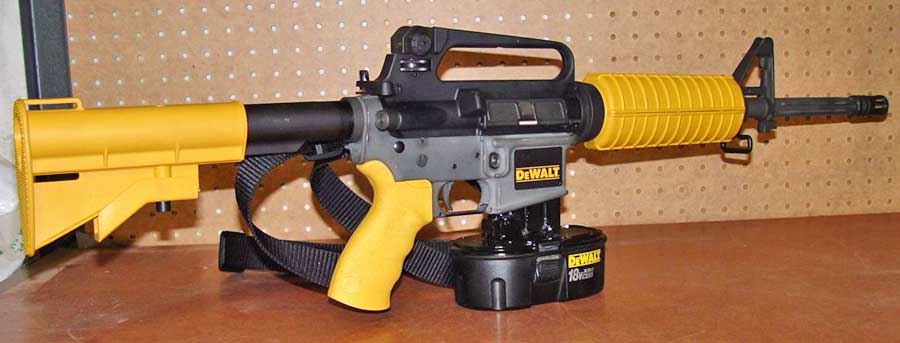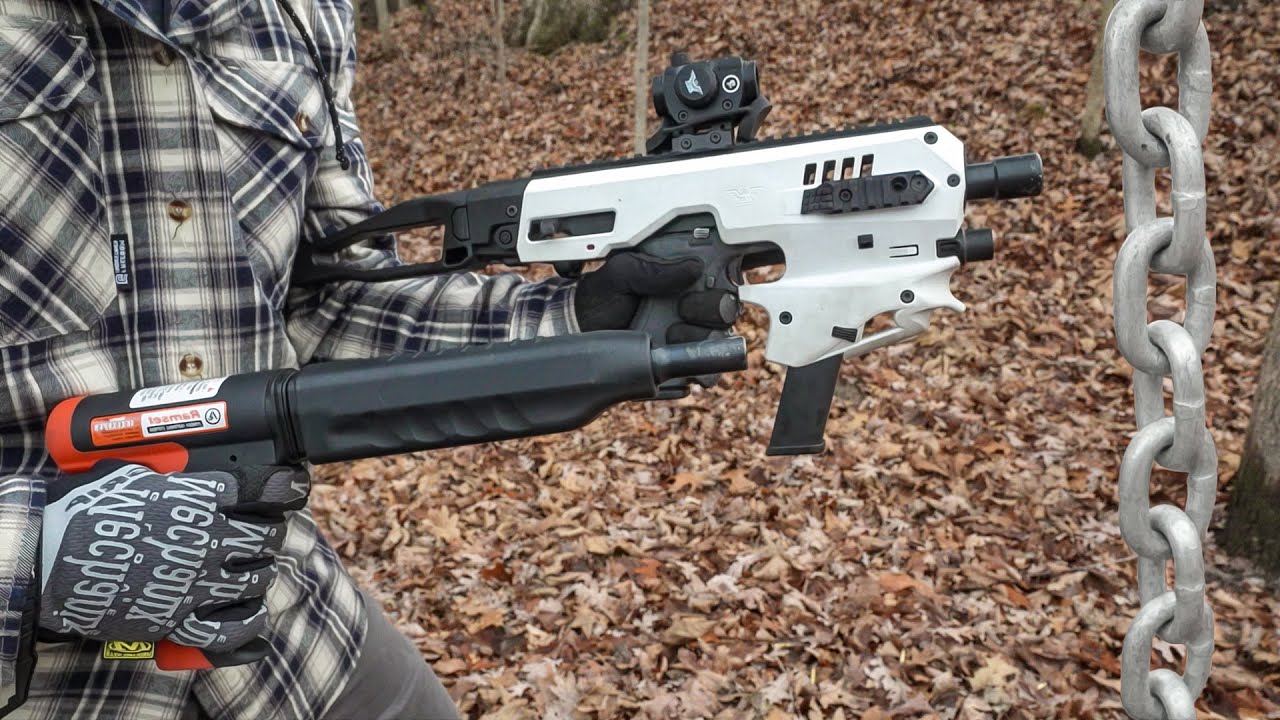Are nail guns firearms? If you’ve ever wondered about this, you’re in the right place! Nail guns are powerful tools found in construction sites and workshops, but are they considered firearms? Let’s dive into this topic and find out the answer together.
Now, you might be thinking, “Wait, why is this even a question? Nail guns and firearms are completely different things!” Well, while they may seem different at first glance, there are some similarities that have sparked this debate.
In this article, we’ll explore the definition of firearms, discuss how nail guns work, and analyze whether or not nail guns meet the criteria to be classified as firearms. So, let’s get started and unravel the mystery of nail guns and firearms!

Are Nail Guns Firearms? Exploring the Truth Behind the Tools
Nail guns are powerful tools commonly used in construction and carpentry projects. They are designed to drive nails into various materials quickly and efficiently. However, there is often confusion surrounding the question, “Are nail guns firearms?” In this article, we will delve into the specifics of nail guns, their functionality, and how they differ from firearms.
Understanding the Functionality of Nail Guns
Nail guns are pneumatic or electric tools that use compressed air or electromagnetism to propel nails into surfaces. They come in different types, including framing nail guns, brad nail guns, and finish nail guns, each designed for specific applications. The mechanism involves a trigger, which, when activated, drives the nail through the material. Unlike firearms, nail guns do not use explosive combustion or bullets. Therefore, they are not considered firearms in the conventional sense.
Nail guns are widely used in construction and woodworking due to their efficiency and time-saving capabilities. By eliminating the need for manual hammering, nail guns allow for faster and more precise nailing. However, it’s important to note that nail guns can still pose serious safety risks if not used properly. Accidental firing, misfires, or nail ricochets can cause severe injuries. Therefore, it is essential to follow proper safety guidelines and receive adequate training before operating a nail gun.
The Legal Distinctions Between Nail Guns and Firearms
In most jurisdictions, nail guns are not classified as firearms. The major difference lies in the purpose and mechanism of these tools. Nail guns are primarily used for construction and woodworking, while firearms are designed for self-defense or offensive purposes. Firearms utilize combustible propellants to launch bullets at high speeds. These fundamental differences in usage and functionality lead to distinct legal implications.
However, it’s important to consider that local laws and regulations may vary. Some jurisdictions may have specific regulations for nail guns, such as age restrictions and licensing requirements. It is crucial to familiarize yourself with the laws in your area to ensure compliance and safe usage of these tools. Consulting with local authorities or legal professionals can provide further clarity on the legal distinctions between nail guns and firearms in your region.
Debunking Myths: Nail Guns and Firearms
Now that we have established that nail guns are not classified as firearms, let’s address a few common misconceptions surrounding this topic.
Myth: Nail guns can be easily converted into firearms
One misconception is that nail guns can be easily modified or converted into functioning firearms. This is not the case. Nail guns and firearms are built with completely different internal mechanisms. A nail gun lacks the necessary components, such as firing pins, chambers, and barrels, to transform it into a firearm. Attempting to modify a nail gun in such a manner is not only illegal but also highly dangerous.
Myth: Nail guns have the same level of danger as firearms
Another misconception is that nail guns are just as dangerous as firearms. While nail guns can cause serious injuries if misused, their level of danger is significantly lower compared to firearms. Provided that proper safety precautions are followed, such as wearing protective gear and using the tool in a controlled manner, the risks associated with nail guns are substantially reduced. It is crucial to emphasize responsible usage and the importance of training when it comes to operating any power tool, including nail guns.
Myth: Nail guns are regulated by the same laws as firearms
Lastly, some people may mistakenly believe that nail guns are subject to the same strict regulations as firearms. As previously mentioned, nail guns are not classified as firearms in most jurisdictions. While local laws and regulations may exist to address safety concerns, the stringent rules and regulations surrounding firearms, including background checks and permits, do not generally apply to nail guns. However, it is important to familiarize yourself with the specific regulations in your area to ensure compliance.
In conclusion, nail guns are not firearms. They are powerful tools used in construction and woodworking that operate on different mechanisms and serve distinct purposes. Nail guns are legal and widely available for purchase and use, but it’s crucial to prioritize safety and receive proper training. By following the necessary safety guidelines and understanding the differences between nail guns and firearms, users can make informed decisions and avoid accidents.
Key Takeaways: Are Nail Guns Firearms?
- Nail guns are not considered firearms.
- Unlike firearms, nail guns are not designed to discharge bullets.
- Nail guns use compressed air or gas to propel nails into surfaces.
- Nail guns are commonly used in construction and carpentry projects.
- It is important to use nail guns safely and follow proper guidelines.
Frequently Asked Questions
In this section, we will address some common questions related to nail guns and whether they are considered firearms or not.
1. Can a nail gun be considered a firearm?
No, a nail gun is not considered a firearm. While nail guns and firearms may share some similarities in appearance and function, there are significant differences. Nail guns are tools typically used in construction and carpentry to drive nails into materials like wood, whereas firearms are weapons designed to discharge projectiles.
Nail guns operate using compressed air, electricity, or fuel, and are intended for non-lethal purposes. They are not designed to cause harm to humans but rather to assist in construction tasks. Even though a nail gun may resemble a firearm, it does not possess the same capabilities or intent.
2. Do nail guns require a license or permit to use?
In most jurisdictions, a license or permit is not required to use a nail gun. Nail guns are generally categorized as tools rather than weapons, and their use is regulated by workplace safety regulations rather than firearms laws. However, it is important to note that regulations may vary depending on your location, so it is always advisable to check with local authorities or consult the applicable guidelines.
While you may not need a license or permit to use a nail gun, it is crucial to follow safety precautions when operating these tools. This includes wearing appropriate protective gear, such as safety glasses and ear protection, and adhering to manufacturer’s instructions to prevent accidents and injuries.
3. Are there any restrictions on purchasing nail guns?
In general, there are no specific restrictions on purchasing nail guns. As mentioned earlier, nail guns are typically considered tools rather than firearms, and their sale is not subject to the same regulations as firearms. However, it is always important to check local laws and regulations regarding the sale and purchase of tools or equipment.
While nail guns are available for purchase by the general public, it is essential to use them responsibly and follow safety guidelines. Improper use or mishandling of nail guns can lead to accidents and injuries.
4. Can a nail gun cause serious injuries?
Yes, a nail gun can cause serious injuries if not used properly or if safety precautions are not followed. Nail guns operate at high speeds and with significant force, which can result in puncture wounds, fractures, or other types of injuries if they come into contact with the body, especially hands or feet.
To avoid accidents, it is crucial to receive proper training in handling nail guns, use appropriate safety gear, and follow manufacturer’s instructions. This includes maintaining a safe distance from the nail gun’s point of impact, ensuring a secure work surface, and being aware of the trajectory of the nails.
5. Are there different types of nail guns available?
Yes, there are various types of nail guns available, each designed for different applications. The most common types include framing nailers, finish nailers, brad nailers, and staplers. The type of nail gun you choose depends on the specific task you need to accomplish. For example, a framing nailer is ideal for heavy-duty tasks like framing or building structures, while a finish nailer is commonly used for precision work, such as installing trim or crown molding.
It is important to select the appropriate nail gun for your intended use and become familiar with its features and limitations. Using the right tool for the job ensures better results and reduces the risk of accidents or damage to materials.

5 Essential Things You NEED to Know About Nail Guns
Summary
So, to wrap things up, nail guns are not considered firearms. They use compressed air or gas to shoot nails into objects. However, they can still be dangerous if not used properly, so it’s important to be cautious and follow safety guidelines.
It’s also important to remember that firearms are designed to shoot bullets and are regulated by laws. Nail guns are tools used for construction or woodworking, and they serve a different purpose. So, while they may look a bit similar, they are not the same thing.
